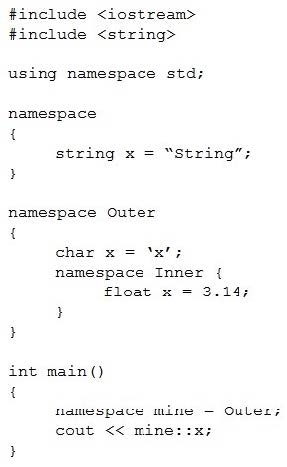Exam Details
Exam Code
:CPA-21-02Exam Name
:CPA - C++ Certified Associate ProgrammerCertification
:C++ Institute CertificationsVendor
:C++ InstituteTotal Questions
:257 Q&AsLast Updated
:Jul 18, 2025
C++ Institute C++ Institute Certifications CPA-21-02 Questions & Answers
-
Question 201:
If there is one, point out an error in the program
#include
using namespace std;
int main()
{
int c = 'a';
switch(i)
{
case '2':
cout<<"OK";
case '1':
cout<<"Error";
default:
break;
}
return 0;
}
A. No Error
B. Use of undeclared identifier 'i'
C. Illegal use of 'continue'
D. Illegal use of 'break'
-
Question 202:
What happens when you attempt to compile and run the following code?

A. It prints: 3.14
B. It prints: Scring
C. It causes a compilation error
D. It prints: x
-
Question 203:
Which of the following expressions decrement variable i by 2? (Choose two.)
A. i and= 0x03;
B. i ? 2;
C. i; i
;
D. i
;
-
Question 204:
What happens when you attempt to compile and run the following code?
#include
#include
using namespace std;
int f(int i);
int main()
{
int i=0;
i++;
for (i=0; i<=2; i++)
{
cout<
}
return 0;
}
int f(int a)
{
return a+a;
}
A. It prints: 202020
B. It prints: 012
C. It prints: 024
D. It prints: 0
-
Question 205:
What will variable "y" be in class B?
class A {
int x;
protected:
int y;
public:
int age;
};
class B : public A {
string name;
public:
void Print() {
cout << name << age;
}
};
A. public
B. private
C. protected
D. None of these
-
Question 206:
What happens when you attempt to compile and run the following code?
#include
using namespace std;
class First
{
public:
void Print(){ cout<<"from First";}
};
class Second:public First
{
public:
void Print(){ cout<< "from Second";}
};
void fun(First *obj);
int main()
{
First FirstObject; fun(andFirstObject); Second SecondObject; fun(andSecondObject);
} void fun(First *obj) { obj?>Print(); }
A. It prints: from First
B. It prints: from Firstfrom First
C. It prints: from Firstfrom Second
D. It prints: from Secondfrom Second
-
Question 207:
What will happen when you attempt to compile and run the following code?
#include
using namespace std;
#define A 1
int main()
{
#if A
cout<<"Hello";
#endif
cout<<"world";
return 0;
}
A. It will print: Helloworld
B. It will print: Hello
C. It will print: world
D. It will print: 0
-
Question 208:
What happens when you attempt to compile and run the following code?
#include
using namespace std;
int main()
{
int i = 4;
while(i >= 0) {
cout<
i??;
}
return 0;
}
A. It prints:"43210"
B. It prints:"3210"
C. It prints: "3210?1"
D. None of these
-
Question 209:
What will be the output of the program?
#include
using namespace std;
int main()
{
const int y = 5;
const x = ?10;
cout<
return 0;
}
A. ?10 5
B. 5 ?10
C. Compilation error
D. None of these
-
Question 210:
What happens when you attempt to compile and run the following code?
#include
#include
using namespace std;
class complex{
double re, im;
public:
complex() : re(1),im(0.3) {}
complex(double n) { re=n,im=n;};
complex(int m,int n) { re=m,im=n;}
complex operator+(complex andt);
void Print() { cout << re << " " << im; }
};
complex complex::operator+ (complex andt){
complex temp;
temp.re = this?>re + t.re;
temp.im = this?>im + t.im;
return temp;
}
int main(){
complex c1(1),c2(2),c3;
c3 = c1 + c2;
c3.Print();
}
A. It prints: 1 1.5
B. It prints: 2 1.5
C. It prints: 3 3
D. It prints: 0 0
Tips on How to Prepare for the Exams
Nowadays, the certification exams become more and more important and required by more and more enterprises when applying for a job. But how to prepare for the exam effectively? How to prepare for the exam in a short time with less efforts? How to get a ideal result and how to find the most reliable resources? Here on Vcedump.com, you will find all the answers. Vcedump.com provide not only C++ Institute exam questions, answers and explanations but also complete assistance on your exam preparation and certification application. If you are confused on your CPA-21-02 exam preparations and C++ Institute certification application, do not hesitate to visit our Vcedump.com to find your solutions here.